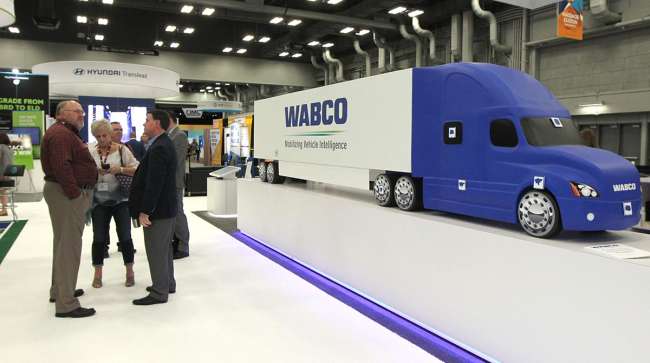Senior Reporter
Wabco Reports Record Annual Revenue

Commercial vehicle supplier Wabco Holdings Inc. reported lower net income and revenue for the fourth quarter, while full-year revenue set a record despite a slowdown in certain key markets.
Net income for the quarter ended Dec. 31 was $114.5 million, or $2.20 per diluted share, on revenue of $911.6 million. That compared with net income of $168.3 million, or $3.12, and revenue of $934.1 million a year earlier.
“In Q4 2018, Wabco faced a slowdown in key global markets, notably in Europe as well as China and India, which was partially offset by growth in the Americas, Japan and Thailand,” Chairman and CEO Jacques Esculier said in a release.
But he said the company “demonstrated its resilience and proven ability to continue to outperform global truck and bus production.”
Supply chain headwinds were significant in the first three quarters, Esculier said during the latest earnings call.
“And as you know, we favored [original equipment manufacturers] to aftermarket to avoid any stoppage of production line at our key customers,” he said, “and that impacted our ability to grow. Now we are back to a normal growth. However, we still suffer — and we’ll probably continue to suffer — from this situation in some important areas of the world.”
Full-year results at the Brussels-based company included net income of $394.1 million, or $7.43, on record revenue of $3.8 billion. That compared with net income of $406.1 million, or $7.50, on revenue of $3.3 billion in the 2017 period.
The company said in the earnings release that it decided to relocate its corporate headquarters to Bern, Switzerland, “with the objective of creating a singular focus on fully globalizing Wabco’s advanced technology strategy.”
Its current base in Brussels will become the headquarters of its newly formed division covering Europe, the Middle East and Africa. It also has a North American business unit based in Auburn Hills, Mich.
“Decoupling Wabco’s corporate headquarters from its four business regions creates a better platform to globally manage the next wave of advanced technologies and scale their adoption in all regions of the world,” Esculier said. “Switzerland is world-renowned for providing a highly favorable environment for breakthrough innovations and offers many distinct advantages for corporate headquarters.”
#WABCO Delivers Record Sales and Operating Income in 2018; Continues to Solidly Outperform Global Commercial Vehicle Market; Provides Guidance for 2019 ➡️https://t.co/dyBCzMoR4F pic.twitter.com/DXGPShsiuw — WABCO (@WABCO) February 15, 2019
Highlights in 2018 included:
• A signed memorandum of understanding with China-based Baidu Inc. to collaborate on developing a best-in-class, cost-effective and highly standardized suite of solutions for Level 4 Autonomous Driving in hub-to-hub highway applications for commercial vehicles.
• An extension and expansion of its relationship with one of the world’s top original equipment manufacturers by signing a $950 million long-term agreement. Under the eight-year agreement, Wabco will equip two of the OEM’s brands with its leading braking, advanced driver assistance systems and efficiency technologies.
• A signed long-term agreement with Hyundai Motor Co., South Korea’s leading manufacturer of commercial vehicles, to furnish the manufacturer with a broad portfolio of its advanced technologies to support series production of Hyundai’s new medium-duty trucks.
• The introduction of its global intelligent braking platform for trailers. The technology provides the foundation for Wabco’s new-generation trailer anti-lock braking system, iABS, and electronic braking system, iEBS. The platform features simplified interchange between iABS and iEBS, enhances trailer system functionality and supports the globalization strategies of trailer manufacturers due to increased standardization and modularity, according to the company.
“The other thing is air disc brakes. I mean, air disc brakes is progressively invading the space in the U.S. But we are, today, about 30% … there is still much room,” Esculier said.
Wabco is a global supplier of braking control systems and other advanced technologies intended to improve the safety, efficiency and connectivity of commercial vehicles.

